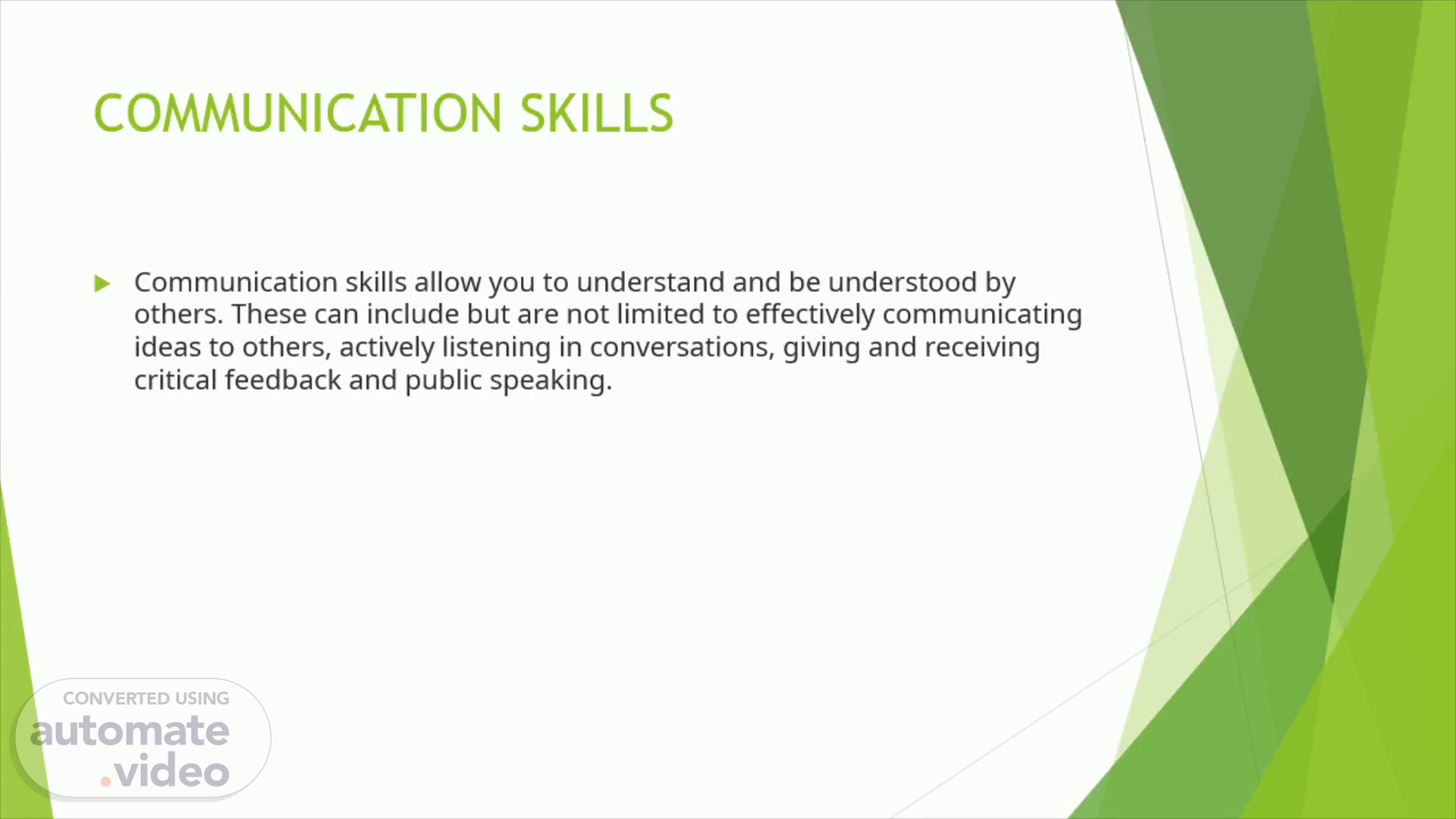
COMMUNICATION SKILLS
Scene 1 (0s)
COMMUNICATION SKILLS. Communication skills allow you to understand and be understood by others. These can include but are not limited to effectively communicating ideas to others, actively listening in conversations, giving and receiving critical feedback and public speaking..
Scene 2 (6s)
What are communication skills?. Communication skills are the abilities you use when giving and receiving different kinds of information. Some examples include communicating new ideas, feelings or even an update on your project. Communication skills involve listening, speaking, observing and empathising . It is also helpful to understand the differences in how to communicate through face-to-face interactions, phone conversations and digital communications like email and social media..
Scene 3 (11s)
EXAMPLES OF COMMUNICATION SKILLS. There are different types of communication skills you can learn and practice to help you become an effective communicator. Many of these skills work together making it important to practice communication skills in different contexts whenever possible. Active listening Active listening means paying close attention to the person who is speaking to you. People who are active listeners are well-regarded by their co-workers because of the attention and respect they offer others. While it seems simple, this is a skill that can be hard to develop and improve. You can be an active listener by focusing on the speaker, avoiding distractions like cell phones, laptops or other projects and by preparing questions, comments or ideas to thoughtfully respond..
Scene 4 (12s)
ADAPTING YOUR COMMUNICATION STYLE TO YOUR AUDIENCE.
Scene 5 (12s)
FRIENDLINESS. In friendships, characteristics such as honesty and kindness often foster trust and understanding. The same characteristics are important in workplace relationships. When you’re working with others, approach your interactions with a positive attitude, keep an open mind and ask questions to help you understand where they’re coming from. Small gestures such as asking someone how they’re doing, smiling as they speak or offering praise for work well done can help you foster productive relationships with both colleagues and managers..
Scene 6 (13s)
CONFIDENCE. In the workplace, people are more likely to respond to ideas that are presented with confidence. There are many ways to appear confident such as making eye contact when you’re addressing someone, sitting up straight with your shoulders open and preparing ahead of time so your thoughts are polished. You’ll find confident communication comes in handy not just on the job but during the job interview process as well..
Scene 7 (13s)
EMPATHY. Empathy means that you can understand and share the emotions of others. This communication skill is important in both team and one-on-one settings. In both cases, you will need to understand other people’s emotions and select an appropriate response. For example, if someone is expressing anger or frustration, empathy can help you acknowledge and diffuse their emotion. At the same time, being able to understand when someone is feeling positive and enthusiastic can help you get support for your ideas and projects..
Scene 8 (14s)
HOW TO IMPROVE YOUR COMMUNICATION SKILLS?. Ask a close friend or colleague for constructive criticism. It can be hard to know how you are perceived as a communicator. To get an objective opinion, ask a trusted friend for their honest feedback. Understanding your areas of improvement for communication can help you identify what to focus on. Practice improving communication habits. Many communication skills are habits you have developed over time. You can improve those skills by practising new habits that make you a better communicator. That might include being more responsive to communications when they are sent, reminding yourself to make eye contact, practising giving positive feedback and asking questions in conversations. Attend communication skills workshops or classes. There are several online and offline seminars, workshops and classes that can help you become a better communicator. These classes may include instruction, role play, written assignments and open discussions. Seek opportunities to communicate. Seek opportunities, on and off the job, that require you to use communication skills. This will help you improve existing skills and allow you to practice new ones. Communicating effectively in the workplace While there are several communication skills you will use in different scenarios, there are few ways you can be an effective communicator at work. Be clear and concise. Making your message as easy to consume as possible reduces the chance of misunderstandings, speeds up projects and helps others quickly understand your goals. Instead of speaking in long, detailed sentences, practice reducing your message to its core meaning. While providing context is helpful, it is best to give the most necessary information when trying to communicate your idea, instruction or message..